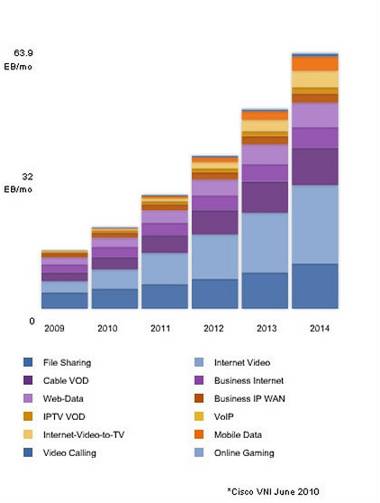Yesterday’s BT announcement regarding Wholesale Content Connect, the Content Delivery product caused some consternation amongst the NetNeutrality fraternity. The fuss is that this product potentially allows ISPs to sell guaranteed delivery of content (mainly video) to online Content Providers (CP) eg YouTube et al.
I would be surprised if this product takes off.
Firstly it would have to be cheaper than what an ISP is currently paying BT for bandwidth otherwise it would be cheaper for the ISP to just buy more bandwidth to accommodate the video. I am waiting for info on the pricing but my gut feel tells me it will be more expensive – BT’s selling point is quality here.
Secondly I haven’t seen a problem where video quality sucks other than on low bandwidth connections and this product would not fix that (silk purse/sow’s ear). Admittedly my own experience is of business broadband rather than consumer but I suspect the point remains. This position could well change of course as more and more people watch video online.
BT Wholesale Content Connect (WCC) is a product that inserts the “paid for” content into the network near to the end user, avoiding the ISPs own backhaul connection. There are three levels – basic, standard and premium. Only basic has been launched.
Basic does use the ISPs own backhaul as opposed to inserting the content after this point. Standard and premium will be available to the few ISPs that use PTA to connect to the network (as opposed to L2TP – sorry for the acronyms) and operate their own backhaul as opposed to BTW’s shared WBMC service.
This might make sense commercially as I can’t see a CP striking agreements with hundreds of ISPs for what might be a very low number of video streams. An aggregator might – is BT going up against the likes of Akamai and Limelight – global players? In which case I still need to understand the benefit to the ISP? I guess where I am coming to is that I can’t see CPs today doing a deal with anyone here. This might change if people are willing to pay more for premium content – eg HD or 3D HD.
The other point is that there are already Content Delivery Networks out there so this is just another one. Existing CDNs inject content into an ISP’s core network as a cheaper way for both the ISP and content providers of delivering the content than via internet transit. BT and their ISP partners will have to sell BTWCC as a better overall deal but I can’t see content providers paying for bandwidth that is currently paid for by the ISP. Moreover CDNs operate internationally and not just in a single country! Why would a Content Provider want to deal with a CDN that only operated in the UK?
Now correct me if I’m wrong but I think that there is only one ISP in the UK that uses PTA – BT Retail (BTR) or two if you want to include BT Plus Net. There are technical reasons why ISPs don’t use PTA, not the least of which is that it doesn’t currently support IPv6 or L2TP forwarding.
In the absence of there being an obvious business model for the ISP what other motives might there be for the launch of the WCC product? It could be that BT is lining up BT Retail to offer a product that is unavailable to the rest of the market even though to Ofcom’s eyes it is being made available as a product through BTW. This might offer BTR a competitive advantage over other major consumer ISPs in being able to provide a guaranteed video product.
From a cost perspective it wouldn’t matter how much BTW charged BTR for this because it would all be recovered at the group level. I’m not saying that this is the motive but it could be one.
Coming back to the opening paragraph there is a scenario that this isn’t a NetNeutrality issue at all but a UK competition law issue. Time will tell – a real business model might appear.
I would say that from a Net Neutrality perspective this is all a fuss over nothing and the advice to politicians is still to sit on the fence. Ofcom might want to consider taking a microscope to the product though, just to be on the safe side. It certainly could add to the argument in favour of breaking up BT into its components. As far as ISPs go those of us who aren’t consumer players aren’t yet involved in the debate. As far as BT goes its cards are currently right up against its chest so who knows whether WCC, as advertised, is a good business or not.
Link to BT video http://www.contentconnect.bt.com/
Sorry about all the acronyms. If they mean nothing to you I would just brush over them and go for the general gist.





